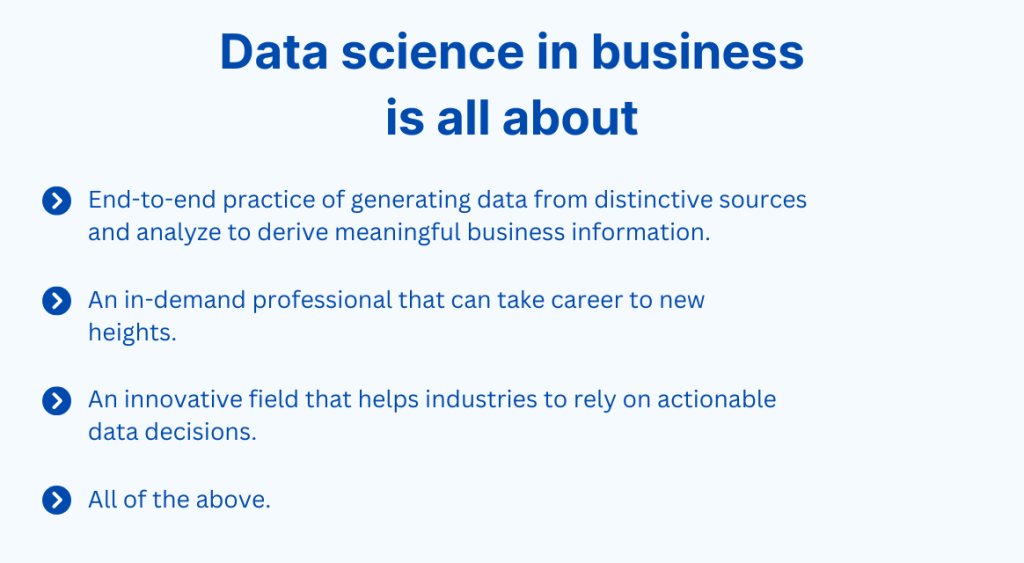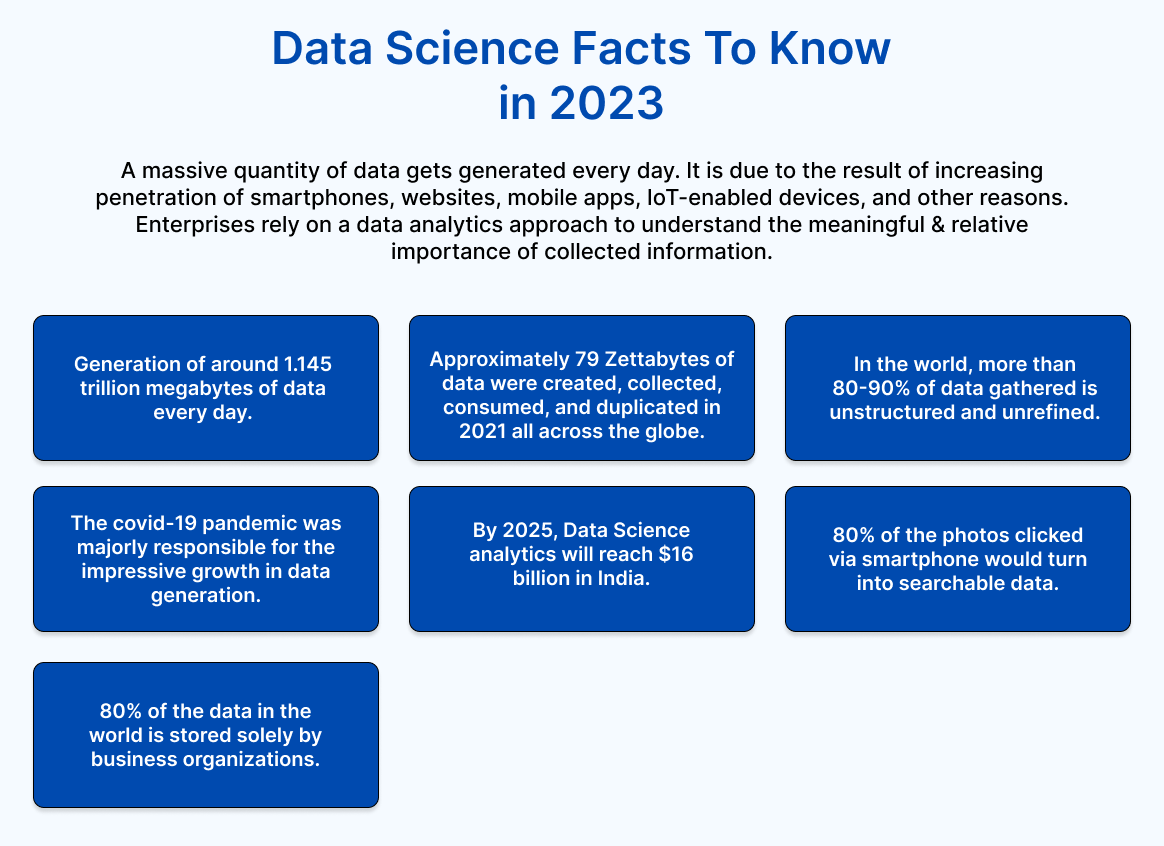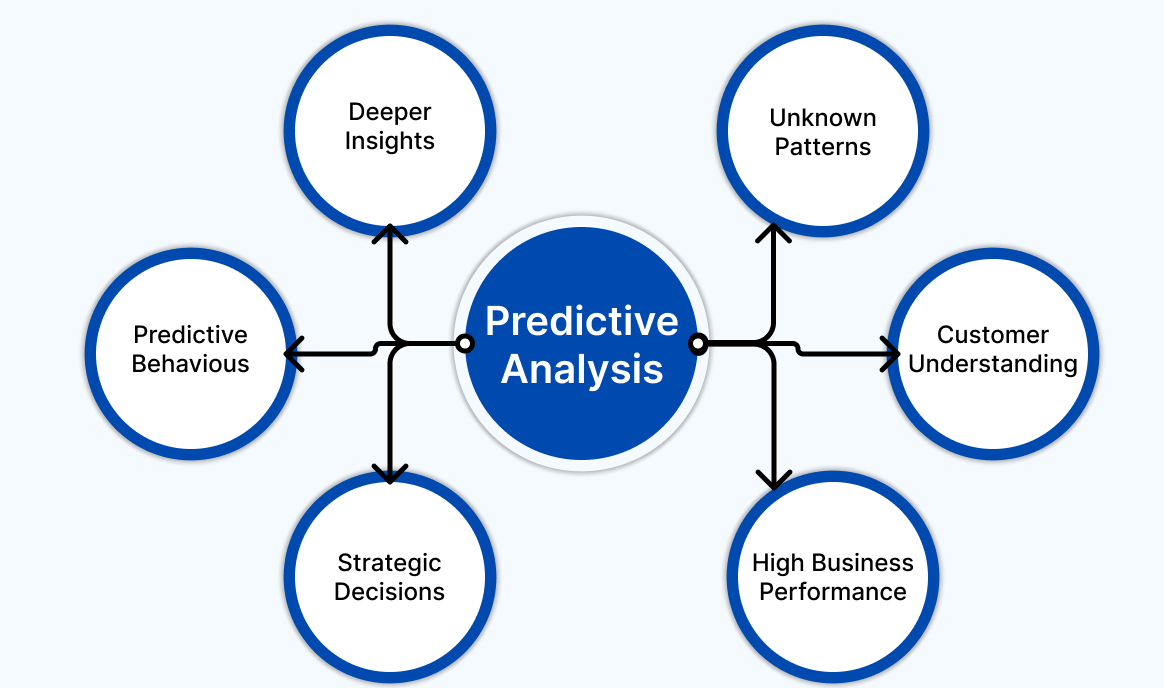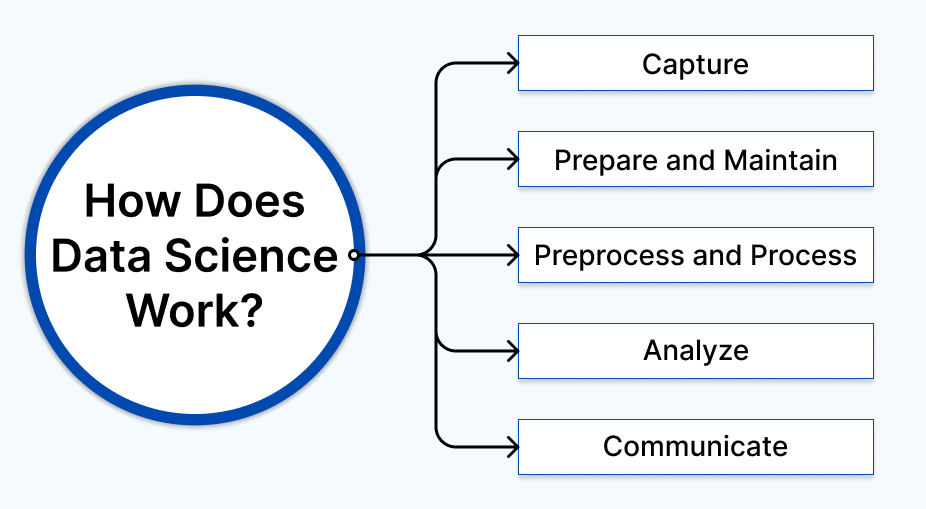Data science in business empowers you to collect, structure, and analyze data derived from multiple sources. It provides businesses a helping hand to derive actionable insights from extensively collected data. To make data-driven & informed decisions to enhance the organization’s reach & revenue. This blog will help you understand the meaningful insights related to data science technology in business. Moreover, get to know data science’s importance, benefits, used cases, and future forecast.
Before getting started, let’s take a mini quiz and know who knows about data science technology.
Well, it’s not a difficult quiz question to answer. And from the above information, you must have realized that the correct answer is “All of the above”.
Here’s, the business-centric meaning of data science technology that you should be aware.
“Data science is an advanced analytics principle that helps organizations to extract valuable information from extensively collected information sets. It has of critical importance for businesses to gain meaningful insights that ultimately help increase operational efficiency, identify new opportunities, and enhance sales programs”.
Read on for a comprehensive look at Data Science technology based on the following key points.
- Data Science Facts To Know in 2023
- Key Functional Areas of Data Science Technology
- How Data Science is Important for Enterprises?
- How Does Data Science Work?
- 8 Industries that Benefit Most from Data Science
- Top 5 Data Science Benefits You Must Be Aware Of
- 5 Data Science Use Cases You Must Know
Data is everywhere across the world. Data generation is inevitable for organizations, social media, search engines, or any platform.
On average, 1.145 trillion MB of data gets generated every day across digital surroundings. Even your social media feed gathers data like your interest level and usage behavior to showcase your particular results.
Similarly, businesses across distinctive domains can leverage generated data to extract valuable insights about their customers, employees, and clients. Ultimately, it helps enterprises better understand their customer’s requirements and offer valuable products/services to increase overall revenue.
Several tech giants rely on data science technology to collect and get insights from massive data to meet customers’ demands with ease. For instance:
- Google processes 20 petabytes every day.
- WhatsApp exchanges 65 billion messages daily.
- Approximately 95 million pictures and videos are shared on Instagram daily.
- Facebook, Microsoft, and Amazon store at least 1,200 petabytes of information daily.
Table of Contents
Data Science Facts to Know in 2023
A massive quantity of data gets generated every day. It is due to the result of increasing penetration of smartphones, websites, mobile apps, IoT-enabled devices, and other reasons. Enterprises rely on a data analytics approach to understand the meaningful & relative importance of collected information.
- Generation of around 1.145 trillion megabytes of data every day.
- Approximately 79 Zettabytes of data were created, collected, consumed, and duplicated in 2021 all across the globe.
- In the world, more than 80-90% of data gathered is unstructured and unrefined.
- The covid-19 pandemic was majorly responsible for the impressive growth in data generation.
- By 2025, Data Science analytics will reach $16 billion in India.
- 80% of the photos clicked via smartphone would turn into searchable data.
- 80% of the data in the world is stored solely by business organizations.
Key Functional Areas of Data Science Technology
At this point, you might have got a general idea of data science. But still, its implementation within your business is unclear. Concerning the same, have a close look at key areas of data science and one used cases for having a better understanding.
- Data Analytics: Just like mentioned in the above part, the key focus of data science technology is extracting meaningful insights. It helps forecast the future after analyzing data sets and enables organizations to make informed decisions ahead.
- Machine Learning: ML algorithms rely on statistics to find patterns in the massive amount of data to provide valuable information. Just like popular platforms like Netflix, Spotify, and YouTube analyze user behavior and provide recommended content accordingly.
- Predictive Analytics: As the name itself implies, this disciple of data science predicts the possibilities of a future event. The best example to understand this concept is applying predictive analysisto credit card services. With the help of this technology, you will gain insights from a credit card user’s previous payment patterns and accordingly forecast the future payments.
- Prescriptive Analytics: Another crucial component of data science is implementing prescriptive analytics. It is a dynamic and intelligently driven approach of a model taking its own decision based on the stored data. Google’s self-driving car is the best example to understand the phenomenon of prescriptive analytics. With the help of data gathered and sorted within the system, the technology allows the self-driving car to run safely and take imperative decisions of turning & stopping.
Why Data Science is Important for Enterprises?
Undoubtedly, data has become an imperative asset for any organization to analyze, predict, and decide for its betterment. In today’s competitive business scenario, enterprises must understand the importance of data science to process and analyze extensive information without much effort.
However, data is meaningful, if stored only until it gets converted, structured, and analyzed for getting useful information. Therefore, data science helps enterprises analyze both structured and unstructured information to find hidden pattern patterns. And further helps in achieving the following few objectives:
- Interpreting a massive amount of data within the company
- Fast, efficient, and informed decision making
- Enable better sales and marketing strategies
- Better identify the target audience
- Reduce the overall operational cost
- Offer personalized customer services & experiences
How Does Data Science Work?
Data science for enterprises is a multi-faceted approach that effectively shifts through the accumulation of raw data and extracts the most vital bits. The process of data science works symmetrically in a continuous flow that covers the following few steps.
- Data Capture: This stage involves collecting business data from multiple sources in a raw format. It includes several data collection methods like manual data entry, real-time data capturing (with the help of IoT technology), web scraping, and more.
- Prepare & Maintain: Next stage involves preparing the collected data and further maintaining it for processing at the next stage. The process involves filtering, cleaning, reduplicating, and reformatting the data accordingly. Some of the data preparation activities that fall under this stage are data mining, data staging, data processing, data storage, data warehousing, and data architecture.
- Preprocess & Process: Once business data is properly prepared, the next stage appears in the form of data classification, data summarization, and data modeling. Under this process, data science experts will look for the patterns, distribution, and values within the data to understand the suitableness before analyzing the same.
- Analyze: In this stage involves the end-to-end process of analyzing the processed data to understand the insights. And using the date for organizational benefit.
- Communicate: The final stage of the data science process comprises communicating the analyzed data by using different visualization tools. You can rely on several data visualization forms like tables, charts, diagrams, images, and more to utilize the information accordingly.
8 Industries that Benefit the Most from Data Science
More and more industries have implemented the virtues of data science technology to make intelligent and informed decisions. Some of the leading ones are as follows:
- Retail: It is of imperative importance that retailers must anticipate the requirements of customers to know what they actually want. It is where data science can help retail companies to gather and analyze customer data to know their preference. It helps provide a personalized shopping experience to customers to enhance their purchasing patterns & product sales.
- Banking & Finance: Data science is disrupting the banking & finance sector in a big way to provide manifold operational benefits. The industry harnesses the power of piles of banking data and financial information to process automation in distinctive ways. It includes beneficial virtues like fraud detection, risk management, securing information, data analysis, sales, marketing, etc.
- Healthcare: The medical industry is also implementing data analytics in a big way to improve patient care. For instance, wearable trackers provide imperative information to doctors about patients’ health vitals to provide relevant treatment. Similarly, such devices with in-built data collection technology provide information on when to take medicine, drink water, and other relevant information. Moreover, data science and analytics are also helping medical institutions to manage patients’ data, improve care, and reduce waiting time.
- Construction: The hardcore construction sector is also not left untouched by the benefits of data science technology. With the help of this data-driven approach, the construction sector can track everything from the expenditures, time needed to construct, building position, and other relevant vitals.
- Transportation: Logistics and transportation services rely majorly on on-time delivery and reaching the destination at a preferred time. Concerning the same, data science in the transportation sector can help map the customer journey, and vehicle position, ascertain unnecessary circumstances, and provide transport information.
- Education: Data science extensively impacts the educational sector by creating a personalized learning atmosphere and improving students’ academic records. With the integrated combination of data analytics, AI, Cloud, and IoT, the education domain witnesses manifold benefits. It includes major ones like anticipating students’ academic results, enriching knowledge retention, understanding learners’ progress, accessing students’ databases, enhancing administrative tasks, and the list goes on.
- Media & Entertainment: In this social media-driven world, users are consuming extensive media in different formats. Major platforms like Netflix, Youtube, and other social media channels offer personalized content based on the user’s interest level. Specifically, with the data science techniques, numerous media & entertainment platforms showcase on-demand content to enhance the interest level and overall viewership. For example, Spotify, an on-demand music streaming platform relies on a data analytics approach to collect & analyze users’ information and offer relevant content digitally.
- Manufacturing: The manufacturing industry relies more on oil, minerals, metals, gas, and various agricultural products for effective functioning and operations. It further leads to generating a huge amount of data that might go untapped, if not implemented the data science virtues. By implementing the same, the industry can predict the effective uses of natural resources, interpret threats, understand soil conditions, and gain other insights.
Top 5 Data Science Benefits You Must Be Aware Of
- Increase business predictability: We have already mentioned that predictive analysis is a part of data science that helps forecast future events. One of the key advantages of data science strategically assists in generating more product demand, forecast manufacturing issues, and understanding operational flaws. Consequently, predictive analytics helps enterprises foresee futuristic happens for better decision-making.
- Get Real-time insights: As mentioned several times above, data science benefits organizations by getting real-time information from data. It happens with the presence of Cloud data warehouses and data lakes that provide impressive computing power to analyze information instantly. Businesses can use this final data output to enhance the operational process, rectify errors & fix and boost sales patterns.
- Gain customer preferences: In continuation with the above data science benefits for organizations, you can unlock customers’ preferences & habits. Based on the processed and filtered data, you can identify buying patterns as per different interest levels and demographics.
- Make strategic business decisions: With the help of professional data science, experts create different data models based on action-oriented funnels. Like most organizations, it provides you an advantage to streamline KPIs and make strategic and accurate business decisions.
- Improve data security: Data science benefits businesses and does not just restrict themselves to data collection and analysis. It further provides end-to-end business data security while keeping sensitive information intact and away from hackers. With the presence of in-built fraud detection, malware protection, and cyber attack prediction, safeguard the information appropriately.
5 Data Science Use Cases from the Big Tech Industry
In this section, you will get to know the real-life data science use cases that tech giants follow and receive substantial results.
1. Facebook– Using Data to Enhance Social Networking
The leading social media platform, Facebook features millions of users today and keeps on increasing with time. The platform extensively relies on quantitative research through data science. And with the purpose to understand more about users, their interactions, interest, and behaviors.
Facebook uses the advanced technology of deep learning, as an integral component of data science in business. This social media platform majorly relies on Facial Recognition and Deep Text to gain users’ insights.
- In facial recognition, the platform uses a neural network to categorize faces based on pictures.
- With deep text or text analysis, the platform understands people’s interests and search patterns to showcase relevant results.
2. Uber– Relying on Data for Making Ride Smooth for Everyone
An on-demand online ride-booking mobile app, Uber with a market share of more than 118 million people makes use of Big Data technology. As most people know, Uber features a large database of drivers, and customers, and keeps several ride-related records. To offer a seamless ride experience, Uber relies on Big Data principal to maintain an extensive database of riders and drivers.
The data-driven technology best infused in the Uber mobile app works seamlessly in the following manner:
- When you book a cab, Uber matches your profile with a nearby driver and charges you based on the time it takes to reach a destination.
- The data-driven technologies calculate the time taken to reach a particular destination through various algorithms.
- Another use of data science in the Uber app is calculating the real-time surge price. Accordingly, when the frequency of drivers is less, the charges might go up and vice versa.
3. Amazon – Predictive Analytics for Personalized Shopping Experiences
One of the leading eCommerce platforms, Amazon relies on predictive analytics to offer personalized shopping experiences to customers. It does in a manner to run a personalized recommendation system and offer related products.
- Amazon platform analysis previous purchase patterns of customers to showcase the related products and enable them to shop more.
- The platform provides suggestions for similar products to gather attention.
- Again based on the purchase history, the Amazon platform sends the interested products to the nearest warehouses to particular customers. This is to ensure fast product delivery.
- This shopping platform optimizes prices based on distinctive parameters like customer activity, order history, product availability, and more.
4. Airbnb – User Data-based Hotel Search Results & Suggestions
Airbnb, an international hospitality company offers distinctive hotel booking services to customers across the globe. Travel is more of a data-centric industry that provides relevant results based on location, budget, and other preferences.
This hotel booking platform features a huge chunk of customer data along with lodging information differentiated into several categories. Importantly, data science plays an integral role in the success of the Airbnb platform and that providing better search results to users.
- Airbnb relies on demographic information to showcase relevant lodging results to users.
- Different country-wise versions of the Airbnb platform are available for catering to the accommodation booking requirements.
- The platform relies on a knowledge graph to match the user’s accommodation preferences based on parameters like budget, locality, and type of lodging.
5. Spotify – Customized Playlists, Spotify ‘Wrapped’ & More!
An online music streaming platform, Spotify uses 600GB of data daily to provide a seamless user experience. It also relies on Big Data to deal with the massive amount of data and provide personalized playlists to users.
- Spotify uses data analytics features to analyze users’ preferences and interests.
- Data science helps the platform to gain insights about the most listening tracks and showcase the relevant results on top.
- It showcases the finding based on Spotify Insights information and provides ongoing trending music.
Concluding Thoughts
In the end, you must have understood how data science plays an imperative in business. It is clear from the above-mentioned information that data science helps businesses to make information-based decisions & stay on the profitable side. It helps understand more about customers, business flaws, and product/service gap, and further increase operational efficiency.
Undoubtedly, data science will be a valuable addition to your company and effectively utilize to know trends, behavior, and patterns. Therefore, you need a professional data science expert’s assistance to implement the solution and foresee the results ahead. Rely on OrangeMantra data science services and professional assistance to get better business insights and move towards unprecedented growth.
FAQs
Q. How is data science used in business?
Data science technology in business seamlessly collect, process, and analyze large volume of enterprise-level data to perform distinctive functions. It helps derive unseen patterns, gain meaningful information, identify errors, and do everything to generate useful information. This technology allows businesses to become data-driven and implement a strategic approach to best meet customer expectations.
Q. What business problems can data science solve?
A business organization can have distinctive internal and external issues that must be identified and sorted well on time. Data science is not a magical phenomenon to solve organizational issues, but it at least helps the company to ascertain the situation and make an informed decision. To be precise, this technology help companies to deal with major issues like fraud detection, ineffective use of resources, finding a probability of customers buying a product, solving crises, and much more.
Q. How does data science add value to a business?
With more than 80% of organizations featuring unstructured data within, data science helps them to utilize data for their benefit. This technology adds value to the business by extracting useful and result-oriented information collected from different sources. Moreover, it brings distinctive elements like data storytelling, information visual representation, and industry-specific knowledge.








